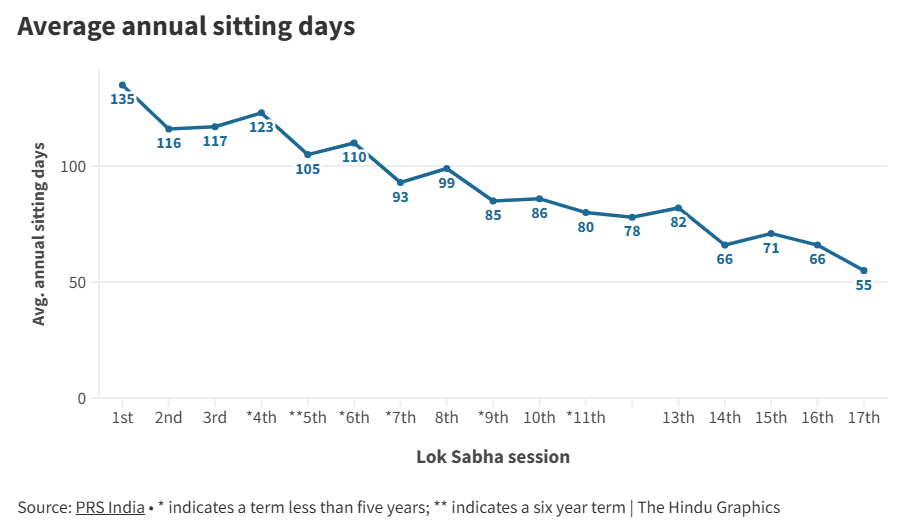- Filter By :
- Polity & Governance
- International Relations
- Social Justice
-
Q. “Declining legislative productivity reflects a deeper crisis in parliamentary democracy and national consensus.” Examine with reference to recent parliamentary sessions in India. (150 words)
29 Jul, 2025 GS Paper 2 Polity & GovernanceApproach:
- Briefly explain the concept of legislative productivity.
- Discuss the recent trends in legislative productivity.
- Highlight the key implications of the lower productivity of the legislature.
- Conclude with a suitable way forward.
Introduction:
Legislative Productivity refers to the efficiency and effectiveness with which Parliament and State Legislatures perform their core functions—lawmaking, executive oversight, budget approval, and debate on public issues. A persistent decline in output signals not just procedural lapses, but a deeper crisis of democratic functioning and erosion of national consensus.
Body:
The recent trends in legislative productivity :
- Number of Sitting Days: Parliament's sitting days have declined from around 135 days/year in the 1st Lok Sabha to just around 55 days/year in the 17th Lok Sabha.
- Despite fewer sitting days, the 17th Lok Sabha passed over 200 Bills, reflecting a high volume of legislative activity.
- Length of Each Sitting: Longer sittings are essential for in-depth legislative deliberation.
- However, in the 2023 Budget Session, Lok Sabha and Rajya Sabha functioned for only 33% and 24% of scheduled time respectively, making it the 6th shortest Budget Session since 1952.
- Number of Members Present: A strong quorum is vital for meaningful debate and informed decision-making.
- In the 17th Lok Sabha (2019–2024), average MP attendance was 79%, but debate participation remained low, with MPs averaging only 45 debates each.
- Level of Disruption: Frequent disruptions, such as slogan shouting and walkouts, drastically reduce debate time.
- The 15th Lok Sabha (2009–14) lost over 30% of its scheduled time to disruptions, severely affecting legislative productivity.
- Examination by Parliamentary Committees: In the 17th Lok Sabha, only 10% of Bills were referred to committees, a sharp drop from the 14th LS (60%), 15th (71%), and 16th (25%), with just 14 Bills reviewed.
- Functioning of Debates: Question Hour & Zero Hour, essential tools for executive accountability, remain underutilized or absent.
- In the 17th Lok Sabha, Question Hour functioned for only 19% of scheduled time in Lok Sabha and 9% in Rajya Sabha.
Implications for Democracy
- Weakens institutional checks and balances by sidelining Parliament's oversight role.
- Reflects a crisis of representation, where public concerns are not adequately discussed.
- Reduces transparency and public trust in democratic institutions.
- Accelerates the ordinance route, bypassing legislative scrutiny (e.g., three farm laws of 2020 introduced as ordinances first).
Conclusion:
As political theorist Rajni Kothari noted, “Democracy is not just about numbers; it’s about negotiated consensus.” Reviving institutional respect, enhancing cross-party dialogue, and promoting reforms like NeVA and increased committee scrutiny are essential to restore parliamentary integrity.
To get PDF version, Please click on "Print PDF" button.
Print PDF





